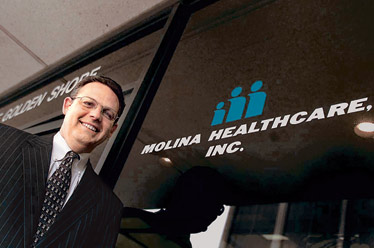Decent health care for poor Latinos often gets lost in translation. ERs can be unfriendly, confusing places, and medical needs are often misunderstood. That's why Dr. J. Mario Molina, CEO of Molina Healthcare, offers a new model: employ bilingual physicians, provide simple brochures in several languages (including Chinese and Cambodian to serve California's Asian population), and run 24-hr. nurse-operated advice lines in Spanish. Launched in 1980 as a small group of Southern California clinics, today the company is a $700 million publicly traded hmo with headquarters in Long Beach, 800,000 customers in six states, and branches in Texas and Ohio expected later this year.
Molina, 47, recalls how his late father, an emergency-room physician, began the clinics to help immigrants on Medicaid who couldn't find doctors willing to treat them for the government program's limited fees. "While most other health-care plans focused on large employer groups, we [focused] on low-income immigrants with language issues," says Molina, an endocrinologist who took over the firm after his father died in 1996. "I grew up with this experience and just built on it." Recently Molina Healthcare began reaching out to other customers with special needs, including people eligible for both Medicaid and Medicare. "These are the most difficult patients — not only do they have all the social problems that come with a low income but they're also elderly or disabled," Molina says.
